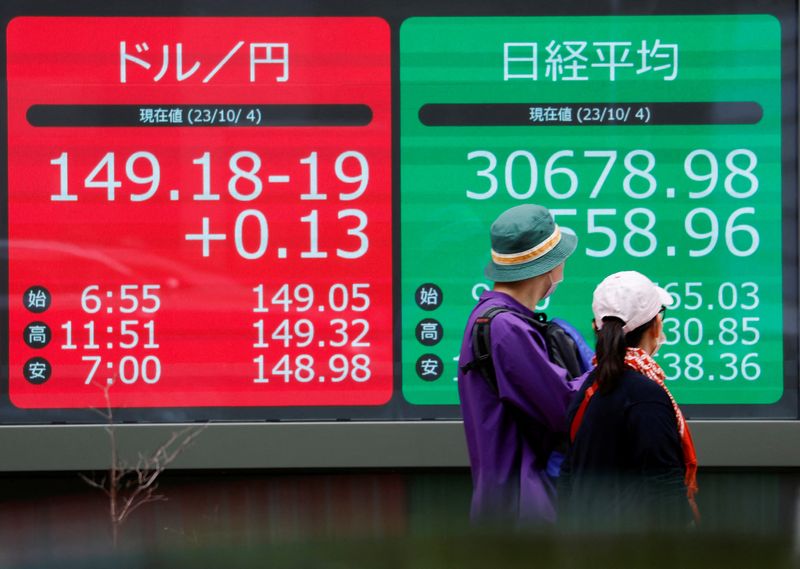Analysis-Kishida’s NISA bet is paying off, just not for Japanese stocks
2023.11.30 00:10

© Reuters. FILE PHOTO: A man looks at an electric monitor displaying the Japanese yen exchange rate against the U.S. dollar and Nikkei share average outside a brokerage in Tokyo, Japan October 4, 2023. REUTERS/Issei Kato/File Photo
2/4
By Junko Fujita and Brigid Riley
TOKYO (Reuters) – Japan’s big tax break to incentivise its citizens to funnel some of the trillions of yen held in cash into stock market investments and boost the economy is succeeding, but only partially.
Under Prime Minister Fumio Kishida, the Nippon Individual Savings Account (NISA) programme — which exempts retail investors from paying capital gains taxes on holdings of stocks — is expanding significantly in scope from January.
And yet, investments under the nine-year-old scheme have historically gone primarily into U.S. stocks, and that Japanese affinity for U.S. stocks could mean Nasdaq is NISA’s biggest winner.
Conversations with brokers and retail investors suggest Japan is having some success with NISA — households are channeling more savings into stocks and taking more risk.
But Kishida was also hoping wealth will be better distributed and household savings will be recycled through companies. That remains wishful thinking.
Overseas stocks dominate the popular investment product rankings at online Japanese brokerages, such as the Monex Group and SBI Securities.
Ideally, Japanese investors would invest in the domestic stock market, inspiring foreign investors to also buy Japanese stocks and in turn broadening Japan’s capital markets in what would be “a very happy scenario for the Kishida administration”, said Takashi Hiroki, chief strategist at Monex.
“The goal of the Kishida administration is to increase household assets. At the end of the day, it’s okay if Japanese household assets are increasing and increasing.”
That they were investing abroad, however, was unfortunate for Japan’s capital markets, he said.
In an aging society where retiring comfortably on a national pension seems increasingly uncertain, NISA has since 2014 been used by working residents and retirees hoping to grow their assets.
Japanese households hold more than 2.1 quadrillion yen ($14.16 trillion) of financial assets, yet their reluctance to take on risk has meant they keep more than half of it in cash, far more than in other developed economies.
Kishida wants to change that mindset in order to create a new, sustainable form of capitalism in the world’s third-largest economy. The prime minister has led government efforts to expand NISA, increasing the total any person can hold under the scheme to 18 million yen from 2024 and making it permanently tax-exempt.
With these changes, the government aims to double in about five years the 33 trillion yen NISA investment balance at the end of June.
NASDAQ OVER NIKKEI
Interest in NISA has grown since the pandemic as mom and pop investors and even younger Japanese were roused by social media influencers into buying stocks. The number of NISA accounts tops 19 million, not significant in a 123 million population, but has risen 46% since 2019.
Analysts at J.P. Morgan expect NISA balances could increase by 45 trillion yen over five years if an average of three million accounts are added annually and purchase amounts increase.
“Nearly 60% of new money under the NISA framework will likely go to foreign investment trusts, mainly for U.S. stocks. The remaining 5-9 trillion yen will be allocated for Japanese stocks,” said Masanari Takada, a quantitative and derivatives strategist at J.P. Morgan Securities.
Monex estimates the proportion of Japanese investors buying purely local stocks dropped to 24% from about 40% over the past 10 years and the top 10 most popular NISA investment packages on its website hold mostly U.S. stocks.
Although investors of all ages are drawn to U.S. stocks, “young people tend relatively to gravitate more toward American companies,” said Maho Tsugawa, a manager at Monex’s public relations office.
“There’s some discussion that stock prices don’t really increase in Japan, and so if you hold onto stocks for a long time to accumulate wealth through something like NISA, prices gradually go down and you end up losing.”
While Average has had a stellar year with 28% gains, its 113% rise in the past decade pales against the U.S. stock market’s 265% rally.
Analysts at BofA say Japan’s investment trusts have been consistently buying foreign equities since 2014 but not local equities.
Such investor bias would botch one part of the vision Kishida has touted since being elected in 2022.
”I think the Japanese government wants money to flow domestically and boost Japanese shares,” said Naoki Fujiwara, senior fund manager at Shinkin Asset Management.
“But the government’s objective is to boost individual financial assets, and it does not matter whether that will be achieved by investing in Japanese or U.S. stocks.”
Investment habits are changing.
Toyama, a 59-year-old investor, who wants to go only by his last name, buys investment trusts and ETFs via NISA. Toyama hopes to turn more aggressive.
“I already have investment trusts that track S&P. I may start investing in individual stocks when the new NISA system starts next year,” he said.
($1 = 147.2600 yen)








